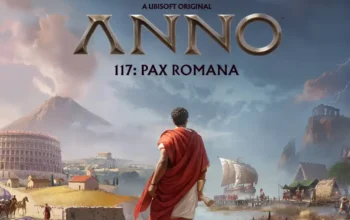Since the release of Dragon Age: Origins in 2009, BioWare has crafted an epic fantasy saga set in the world of Thedas. This world is defined by complex political intrigue, moral decisions, and unforgettable companions. Last year, a new entry in the series launched and changed everything.
Summary
Last year, Dragon Age: The Veilguard marked a turning point for the franchise. Sales were below expectations, and the developers have shifted focus toward Mass Effect 5. Does this signal the end of the Dragon Age era? Today, we embark on a journey through the Dragon Age games. Here you’ll learn everything about the origins, the spin-offs, and the main entries, as well as a look into the future of the franchise in our Pixel Sundays article.
The Main Series – From Origins to Veilguard
It all began in 2009 with Dragon Age: Origins. This game places a strong emphasis on narrative depth. At the start, you must choose your race—dwarves, elves, or humans—as well as your class and origin, which forms your personal “Origin Story.” Your background story significantly influences dialogue and the overall game experience.
Storytelling is considered BioWare’s masterpiece, filled with interwoven choices that even give side quests major impact on your journey. Upon release, outlets like Wired hailed it as a return to classic RPG roots. A game with a tactical combat system, pause mechanics, deep character bonding, and an emotionally gripping narrative from the first act onward.
In 2010, Origins – Awakening followed as a full-fledged expansion. It takes place six months after the events of the main game in Amaranthine. You can either import your character from the first game or start fresh at level 18. The game adds five new companions, including Oghren. Party levels increase, with new abilities, specializations, and enemies. Reddit users praise the expansion for meaningfully continuing the main story instead of feeling like a separate DLC.
![]()
Then came 2011 with Dragon Age II. This time you play as Hawke, a refugee fleeing the Blight with their family to settle in Kirkwall. Within a decade, Hawke rises from obscurity to become a key figure in a city riddled with power struggles, family tragedies (like the murder of their mother), and social tensions between the Templar Order and the Qunari. While praised for its story and character development, the limited world and repetitive environments drew heavy criticism.
With Dragon Age: Inquisition in 2014, the franchise returned to a vast open world. You become the leader of the Inquisition, tasked with sealing breaches in reality. The gameplay merges fast-paced action with tactical pause mechanics. Critics noted a successful fusion of Dragon Age II and Origins. The game was also the most commercially successful in the series, selling over 12 million copies according to BioWare, making it the studio’s biggest success to date.
![]()
As a direct sequel, Dragon Age: The Veilguard was released in 2024, ten years later. The game features an episodic level structure and a new god-defying plot. You choose between three main classes – Warrior, Mage, or Rogue – each with two weapon types. In combat, you can switch between certain abilities on the fly, adding more tactical depth. Battles take place in real-time, but you have the option to pause and issue commands to your party.
Spin-offs & Companion Media – Dragon Age Stories Beyond the Main Series
In addition to the expansive main series, the Dragon Age franchise has seen several spin-offs and appeared in other media. It all started in 2009 with Dragon Age Journeys, a tactical hex-RPG Flash game intended to span three chapters, though only the first, “The Deep Roads,” was released. Developed by EA 2D in collaboration with BioWare, the game served as a playable prelude to Origins and allowed players to unlock equipment for use in the main game.
![]()
The gameplay was turn-based and somewhat reminiscent of Heroes of Might and Magic. You controlled three characters across hex-based combat arenas, using skills and potions. For a Flash game, it offered surprisingly deep tactics.
Legends was the successor to Journeys, released in 2011 on Facebook/Google+. It was a freemium Flash strategy RPG running parallel to Dragon Age II. The game included some multiplayer elements (like summoning Facebook friends as avatar allies) and allowed you to unlock rewards for Dragon Age II. In 2012, the servers were shut down, though offline play remained possible afterward.
![]()
In 2013, a mobile 3D collectible tactics game for iOS and Android titled Heroes of Dragon Age was released. You assembled a six-character team from well-known series figures. Battles played out automatically, with your strategic input limited to unit selection and formation. The game featured microtransactions for faster progression and was shut down in 2023.
The Last Court is a browser-based, text-driven strategy/card game by Failbetter Games, inspired by the style of Fallen London. You play as the Marquis/Marquise of Serault, managing your domain, navigating resources, intrigues, advisors, lovers, and more. It provides a narrative bridge between Dragon Age II and Inquisition. Your decisions could unlock missions in Inquisition’s war table or influence Skyhold’s stained-glass windows. The servers shut down in 2020, but fans managed to archive the content.
![]()
Beyond games, the franchise also includes a series of novels. Titles like The Stolen Throne, The Masked Empire, and the short story collection Tevinter Nights (2020) offer deeper insights into characters, politics (such as in Orlais or Tevinter), historical events, and possible future scenarios. Tevinter Nights in particular is praised for its rich world-building and encounters with iconic characters.
Additionally, Dark Horse Comics published several graphic novels including The Silent Grove (featuring Alistair/Varric/Isabela in Antiva), Magekiller, Knight Errant, Deception, and more. These comics extend the lore beyond the games and highlight side characters like Marius, Vaea, and Olivia Pryde—earning praise for their storytelling and production quality.
Technology & Design – Engine Development and RPG Style
Over time, technology and game design have undergone significant changes. In the early days, the series featured tactical real-time combat with a pause function and a top-down perspective. With Dragon Age II, the combat system became much faster, though the gameplay remained in real time. However, the top-down view and complex tactics were removed, shifting the focus to responsive combos and stylish action.
![]()
Inquisition combines action and tactics. The game offers real-time combat with an optional pause mode, making it ideal for tacticians while also being enjoyable as a fluid action experience. The Veilguard moves towards a pure real-time hack-and-slash style like God of War. There’s no more pause mode, and you control only your main character. The gameplay emphasizes fast combos, dodging, parrying, and open arena battles.
Origins was developed using the Eclipse Engine, specifically created for the game. The design focus was on a party-based RPG with top-down tactics and static lighting. Dragon Age II used the Lycium Engine (an evolution of Eclipse), resulting in a faster, more action-oriented experience with third-person combat.
![]()
Dragon Age: Inquisition was built on EA’s Frostbite 3 engine, which had RPG tools like quest dialogue, save systems, and a pause mode. It also featured PBR rendering. The Veilguard continued with the Frostbite engine but focused on real-time action. The engine enabled advanced rendering, a reduced open world, and a hub-based level structure.
The series has evolved from slow, tactical RPG battles to fast, reflex-driven action gameplay. The engine progression (Eclipse → Lycium → Frostbite) reflects this shift towards more stable tech and improved graphics. The core RPG system with classes, talents, and party compositions remains, but Veilguard completely removes the traditional tactical element.
Dragon Age: The Veilguard – The Controversial Finale?
Dragon Age: The Veilguard released on October 31, 2024, for PS5, Xbox Series X/S, and PC. It used the controversial Frostbite engine, which caused major development challenges. The game had a strong launch with over 85,000 concurrent Steam players, but only around 1.5 million active players in the first three months—far below EA’s expectations of 3 million, leading to restructuring at BioWare.
![]()
The original plans for the game involved a live-service title using the Anthem engine with multiplayer mechanics, but those plans were scrapped. From 2015 to 2021, the project repeatedly switched between single-player and multiplayer concepts. In 2020, development was restarted from scratch as a real-time action game inspired by God of War. These changes caused significant delays and internal issues.
The game was received as mostly positive by fans and critics. On Metacritic, it’s labeled as “generally favorable,” while Steam users give it an average score of 69%. It was nominated for several awards but didn’t win any.
Outlook – What Comes After Veilguard?
BioWare officially confirmed that no DLCs will be made for The Veilguard. All studio resources are now focused on developing Mass Effect 5. Due to Veilguard’s lackluster performance, about two dozen employees were laid off, and the rest were reassigned to Mass Effect 5. The studio has shrunk to fewer than 100 employees, with some staff transferred to other EA studios.
![]()
Whether we’ll see a Dragon Age 5 remains uncertain. EA has shifted its financial strategy, and the community is divided between wanting a new mainline title or spin-offs. A reboot is unlikely given the weak performance of the last game.
Conclusion – A Cycle Ends, a New One Begins
Dragon Age: The Veilguard closes a chapter that began in 2009 with Origins. Over the years, the series has changed significantly in terms of story, gameplay, and technology. It started as a tactical party-based RPG focused on player choice and political intrigue. Today, it’s an action-heavy third-person game with modern design.
![]()
Still, the game’s core DNA has remained. Yet this transformation has been met with mixed reactions from fans. Veilguard isn’t a bad game—it’s just different, and that difference failed to win over players and critics alike. The franchise’s future is uncertain, as BioWare shifts focus to Mass Effect 5. Whether we’ll return to Thedas is unknown—but Dragon Age’s influence on modern RPGs remains undeniable.
Download the Allkeyshop Browser Extension Free
For all the latest video game news, trailers, and best deals, make sure to bookmark us.
You can find all the best and cheapest online deals on CD keys, game codes, gift cards, and antivirus software from the verified CD key sellers on our store pages.
To not miss any news on Allkeyshop, subscribe on
Google News
.
MORE RELEVANT ARTICLES
Game News
Review Film
Rumus Matematika
Anime Batch
Berita Terkini
Berita Terkini
Berita Terkini
Berita Terkini
review anime
Gaming Center
Gaming Center
Gaming center adalah sebuah tempat atau fasilitas yang menyediakan berbagai perangkat dan layanan untuk bermain video game, baik di PC, konsol, maupun mesin arcade. Gaming center ini bisa dikunjungi oleh siapa saja yang ingin bermain game secara individu atau bersama teman-teman. Beberapa gaming center juga sering digunakan sebagai lokasi turnamen game atau esports.


